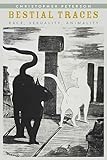Bestial Traces : Race, Sexuality, Animality / Christopher Peterson.
Material type: TextPublisher: New York, NY : Fordham University Press, [2022]Copyright date: ©2013Description: 1 online resource (208 p.)Content type:
TextPublisher: New York, NY : Fordham University Press, [2022]Copyright date: ©2013Description: 1 online resource (208 p.)Content type: - 9780823245215
- 9780823291014
- online - DeGruyter
| Item type | Current library | Call number | URL | Status | Notes | Barcode | |
|---|---|---|---|---|---|---|---|
 eBook
eBook
|
Biblioteca "Angelicum" Pont. Univ. S.Tommaso d'Aquino Nuvola online | online - DeGruyter (Browse shelf(Opens below)) | Online access | Not for loan (Accesso limitato) | Accesso per gli utenti autorizzati / Access for authorized users | (dgr)9780823291014 |
Frontmatter -- Contents -- Acknowledgments -- Introduction -- 1 Aping Apes: Edgar Allan Poe’s “The Murders in the Rue Morgue” and Richard Wright’s Native Son -- 2 Slavery’s Bestiary: Joel Chandler Harris’s Uncle Remus Tales -- 3 Autoimmunity and Ante-Racism: Philip Roth’s The Human Stain -- 4 Ashamed of Shame: J. M. Coetzee’s Disgrace -- Afterword -- Notes -- Bibliography -- Index
restricted access online access with authorization star
http://purl.org/coar/access_right/c_16ec
On February 18th, 2009, Sean Delonas published a controversial cartoon in the New York Post depicting two policemen shooting and killing a monkey with the caption: “They’ll have to find someone else to write the next stimulus bill.” On the adjoining page was a photo of President Barack Obama signing this very piece of legislation into law. Although public debate over the cartoon has centered entirely on its potentially racist overtones, we might ask from a Darwinian perspective how the stereotype of the black ape works to disavow a universally shared human apehood. How might we comprehend animality in non-pejorative terms? Whereas in contemporary race and sexuality studies the topic of animality emerges almost exclusively in order to index the dehumanization that makes discrimination possible, Bestial Traces argues that a more fundamental disavowal of human animality conditions the bestialization of racial and sexual minorities. Hence, when conservative politicians such as Senator Rick Santorum equate homosexuality with bestiality, they betray an anxious effort to deny the animality inherent in all sexuality. Focusing on literary texts by Edgar Allan Poe, Joel Chandler Harris, Richard Wright, Philip Roth, and J.M. Coetzee, together with philosophical texts by Derrida, Heidegger, Agamben, Freud, and Nietzsche, Peterson maintains that the representation of social and political others as animals can be mitigated but never finally abolished. Insofar as humanizing the abject only vacates the structurally empty and infinitely transposable position of “the animal,” he argues that all forms of belonging—no matter how open and hospitable they are toward others—inevitably produce “beasts” whose exclusion contradicts our apparent desire for nonviolence. While one might argue that absolute political equality and inclusion remain desirable—even if ultimately unattainable—ideals, Bestial Traces shows that by maintaining such principles we exacerbate rather than ameliorate violence precisely by failing to confront how discrimination and exclusion condition all social relations.
Mode of access: Internet via World Wide Web.
In English.
Description based on online resource; title from PDF title page (publisher's Web site, viewed 03. Jan 2023)


